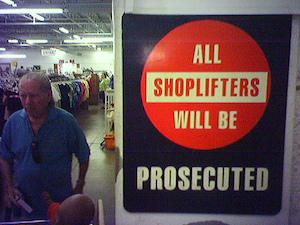I Don’t Know What I Would
Have Done Without Him...
Retail Theft
Defending Against Retail Theft Charges – Illinois Theft Attorneys

If you have been arrested and charged with retail theft, most commonly in the form of shoplifting, it is important to seek legal advice as soon as possible. It is not as simple as paying for the items that were stolen and forgetting about it. In the State of Illinois, a shoplifting or other retail theft charge can become a felony under many different circumstances, with very low relative value. Retail theft is the act of taking something from a retail establishment without tendering the proper payment for it. This can be as simple as hiding an item in a bag or as complex as modifying bar codes to produce a lower price when scanned at checkout. There is a presumption that a concealed item evidences an intent to take that article, which is one of several specialized provisions applicable to a charge of retail theft. Therefore, it is critical to enlist the assistance of an experienced criminal defense attorney in order to negate the element of knowledge as part of an overall defense.
Zealously Advocating against Retail Theft Charges
David L. Freidberg is a Chicago attorney who has spent more than 25 years amassing legal expertise defending the rights of those accused of a crime. Mr. Freidberg brings those skills and experience to his role as a retail theft defense attorney. In defending against a charge of taking an item sold, stored, displayed, or held at a retail establishment without paying the set price, it is necessary to examine the arresting officer’s report, any surveillance evidence, records from the scanning devices at the exit of the business, and eyewitness testimony in order to expose the weaknesses in the prosecutor’s case. Mr. Freidberg will enlist his team of colleagues and professional investigators to build the best possible defense in accordance with the circumstances of the specific case.
Overview of Retail Theft Laws in Illinois
Under Illinois law, the offense of retail theft is set forth under 720 ILCS 5/16-25 . There are many different actions that fall within the umbrella of retail theft. There also are several factors that will increase the severity of the charge if they apply to the defendant. The following actions may result in a charge of retail theft:
- Taking an item without payment – if a person knowingly possesses, transfers, carries away, or promotes the carrying away of any item from a retail establishment without paying the value determined by the merchant and with the intent of permanently depriving the merchant of the use of that item, then that person may be guilty of retail theft. ( 720 ILCS 5/16-25 ).
- Altering the item’s price tag or bar code – if a person changes, alters, removes, or recodes a price tag or bar code in order to pay less than the set value, as determined by the merchant, then that person may be charged with retail theft.
- Using a device to jam the security alarms – if a person utilizes an electronic mechanism to block or jam a security device in order to take an item past a scanning device without making full payment, it is retail theft;
- Not returning property after a lease has expired – if a person has leased an item and failed to return the item or pay the value as set by the merchant within ten (10) days of a written demand for the return of the item then it is retail theft.
- Returning an item that is not owned by the person effectuating the return – if a person uses false documentation, including a fake receipt, to return or exchange property of which he is not the owner, then it is retail theft.
- Exiting through an emergency door – if a person uses the emergency exit to take merchandise from as retail business without the full payment, then it is felony retail theft.

The laws surrounding retail theft are crafted to be favorable to the retail merchants. Therefore, there are a series of presumptions that come into play, and many penalties that are far more severe than a person might think. A skilled criminal defense attorney is imperative to set forth the best defense possible.
Penalties for Retail Theft
The penalties for retail theft vary widely:
- If the item taken was $300.00 or less, then the theft is a Class A misdemeanor, punishable by up to one year in jail and a fine up to $2,500.00. A Class A misdemeanor conviction for retail theft is not eligible for expungement or sealing.
- If the stolen merchandise has a value greater than $300.00, then the offender may be charged with a Class 4 felony, eligible for one to three years in prison and a fine of up to $25,000.00. Generally, felony convictions are not eligible for expungement or the sealing of a record.
- If the offender took merchandise through an emergency exit, then it is a Class 4 felony, regardless of the value of the item(s) being taken. If it is a second offense, then the offender may be charged with a Class 3 felony and may face two to five years in prison.
- A permanent criminal record will result from any of these charges if convicted.
A criminal record will have an impact on every aspect of an offender’s life, creating complications in pursuit of educational prospects, employment, state or federal benefits and rights, and other important benefits and opportunities.
Additional Considerations in Retail Theft Cases
Retail theft laws are more punitive than the average person may think. There are a series of circumstances that will increase the severity of the sentence, including the use of an emergency exit discussed above. Some other considerations include:
- There are presumptions in effect – if a person conceals merchandise that has not been paid for on his person or within his belonging then there is a presumption that he was knowingly committing retail theft. In addition, if a person has merchandise that has not been paid for and advances beyond the last cashier or other payment station, then there is a presumption that the person knowingly committed retail theft.
- Enhanced penalties for previous offenses – if the person charged with retail theft has been charged with a prior offense of retail theft, as well as theft-related charges such as possession of burglary tools, robbery, armed robbery, residential burglary, or home invasion, then the retail theft charge will be a Class 4 felony.
- The value of the property will be aggregated – if the person charged with retail theft had many items of minimal value in his or her possession, then the value of the items will be totaled to reach the felony threshold. Moreover, if the person is part of an organized retail theft involving more than one person, then the value of the items in the possession of everyone involved in the theft is aggregated to reach the higher threshold for all offenders.
- A merchant may detain a person suspected of retail theft in a reasonable manner and for a reasonable time, in order to obtain and verify identification, notify the appropriate authorities, and turnover custody of the alleged offender. This will not support a claim of false imprisonment.
- A simple misdemeanor can become a Class 2 Felony Robbery if the person suspected of retail theft commits an act of battery against the owner of the property while committing the retail theft.
There are severe penalties involved with the theft of a relatively low value item, so it is important to enlist the assistance of an experienced attorney as soon as possible.
There are additional civil penalties possible against someone suspected of retail theft. You very well could receive a notice in the mail from a collection agency demanding payment up to $1,000.00. You need to be aware that the payment of these penalties will in no way effect your criminal case. Whether you pay the civil penalty or not, the criminal case will proceed. If you choose not to pay the civil penalty, the collection agency could file a complaint in civil court for the recovery of the penalty and additionally request attorneys’ fees and court costs as well. This can add quite a bit of money to the amount you might owe.
David L. Freidberg Defends Clients Charged with Retail Theft Aggressively
Chicago attorney David L. Freidberg is a criminal defense attorney with more than 25 years of legal experience. Mr. Freidberg represents clients who have been arrested or charged with retail theft. Mr. Freidberg’s talented group of retail theft attorneys are aware of all the factors that are part of a retail theft case and know how to defend against the offensive put forth by the prosecutors. The legal team will review the facts and evidence of the case and develop an effective defense that will culminate in the best result possible, whether that is a dismissal of the charges, an acquittal, or a minimization of the severity of the sentence. By conducting an independent investigation, reviewing all of the facts, analyzing the witness and recorded evidence, and scrutinizing the arrest and charging procedures, the lawyers will work with you to arrive at the best achievable outcome. We offer a free consultation so that we can evaluate your situation and provide preliminary advice so call us at 312-560-7100 or email us to learn how we can help.

